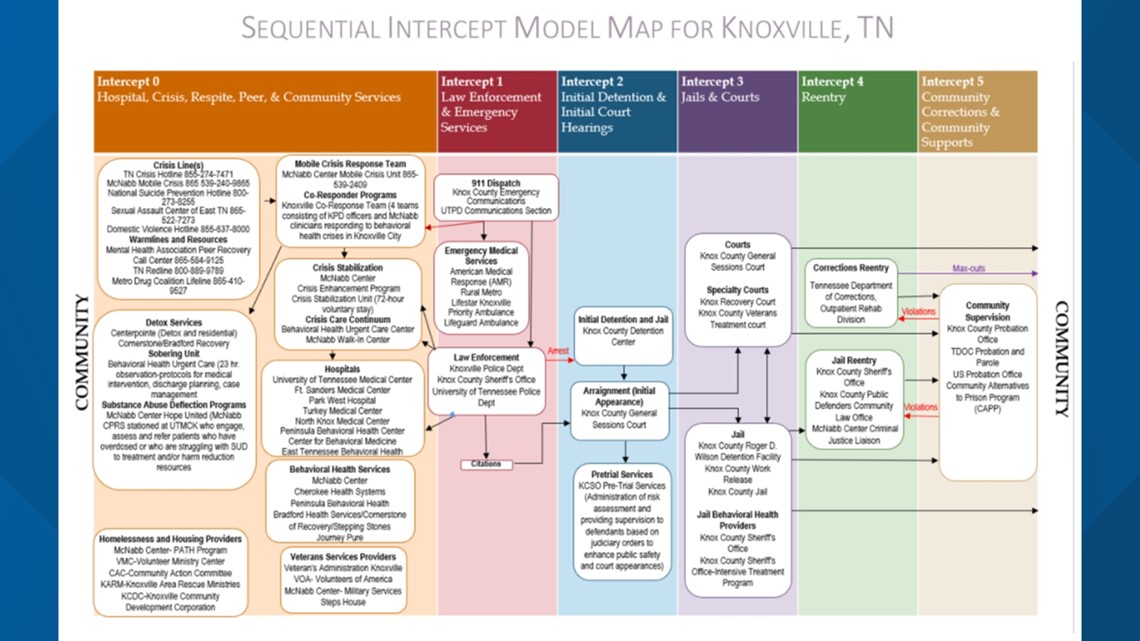KNOXVILLE, Tenn. — In April 2022, city and county leaders met for a workshop to develop a report that analyzes ways Knox County and Knoxville could better serve people involved in the criminal justice system, and help them connect with resources if they have mental health or substance use needs.
They will meet on Thursday at 5 p.m. to discuss that report and its findings.
The report used the "Sequential Intercept Model," a kind of approach that helps states and communities assess available opportunities for improvement, determine gaps in services and plan for community change.
"These activities are best accomplished by a team of stakeholders that cross over multiple systems, including mental health, substance abuse, law enforcement, pretrial services, courts, jails, community corrections, housing, health, social services, peers, family members, and many others," the report said.
Through SIM mapping, community leaders can illustrate how people with behavioral health needs come into contact with the criminal justice system and flow through it. By looking at how they flow through the system, leaders can find opportunities to link them to services and prevent them from entering the criminal justice system again.


In the report, it says 81 out of the Knoxville Police Department's 374 officers are trained in responding to people in crisis.
It also said the Knoxville Co-Response Team, which pairs officers with mental health professionals, has taken less than 1% of the people they've interacted with to jail. The team, which is made up of four groups, also never had to use force.
The Knox County Sheriff's Office did not get a count of its deputies trained in crisis intervention, according to the report. However, the report said 80 officers are trained in crisis intervention at the Knox County Jail. It has a population of 1,072 people, according to the report.
KCSO also provides the jail's behavioral health and medical help, including the "Intensive Treatment Program" providing substance use treatment, according to the report. It said the jail's behavioral health staff consists of four social workers, a psych NP, a psych nurse, a medical technician and "0.5 psychiatrist."
It also said funding ran out for the jail's "Shot at Life Program."
"There was also discussion of individuals being held months in jail awaiting a substance use treatment bed because of lack of insurance coverage," the report said.
The University of Tennessee Police Department said up to 65% of its officers are CIT trained. However, state police said they rarely handle mental health issues.
The report also found that KPD highly utilizes nine "behavioral health urgent care diversion" charges, while KCSO "highly underutilized" them.
The report said the county and city could add unique responses for issues that the community's refugee population could face, and said it is currently difficult to get veterans who need mental health care connected with the VA due to bureaucratic challenges.
The report also said there are 75 clients in Knox Recovery Court, which is meant to divert people experiencing mental health issues from jail. Twenty-five clients are in Knox County Veterans Treatment Court. There are seven social workers on staff at the Public Defender's Office, and less than 1% of cases go through specialty courts, according to the report.
The report made ten suggestions to improve how the city and county connect people to mental health care and substance use treatment, listed below.
- Continue to shape efforts by formalizing a City/County Criminal Justice/Behavioral Health Planning Body to address the needs of justice-involved persons with mental health and substance use disorders
- Address Collateral Sanctions that may undermine recovery and rehabilitation objectives.
- Strategically address the Uninsured Population to increase access to services and reduce the cross-cost burden on Emergency Departments and the criminal justice system, especially the jail.
- Explore more prevention options to prevent people from being involved in the justice system.
- Consider the use of telehealth strategies to support law enforcement officers and other first responders responding to crisis situations.
- Implement/expand evidence-based practices for substance use treatment for justice-involved individuals.
- Expand diversion opportunities beyond the Specialized Court approach. Develop more formal and coordinated screening and diversion strategies for arraignment diversion and pre-plea diversion.
- Address the Incompetent to Stand Trial (IST) population.
- Increase and improve transportation options.
- Increase and improve housing options.
People from THP, KCSO, KPD, UT, the McNabb Center, Bridge Refugee Services, Knox County General Sessions Court, Positively Living/Choice Health Network, Covenant Health, and the Tennessee Department of Correction participated in the workshop for the report, among many other.



